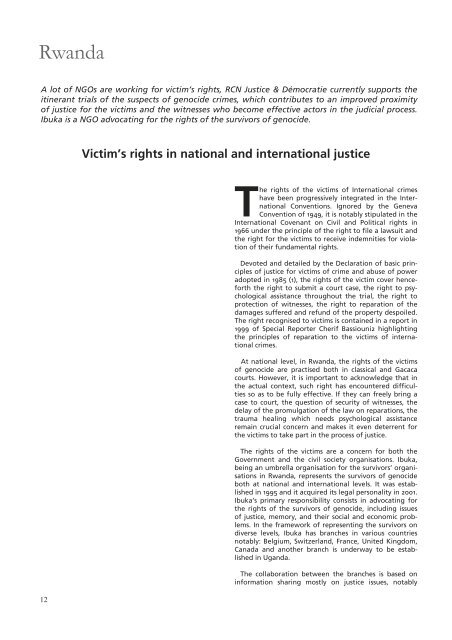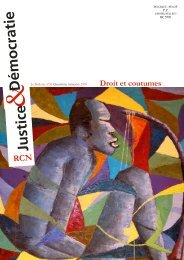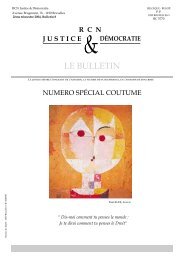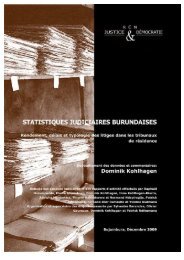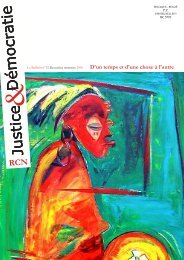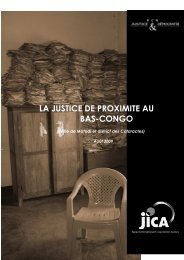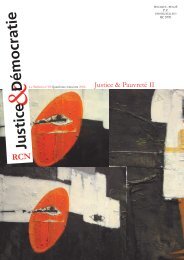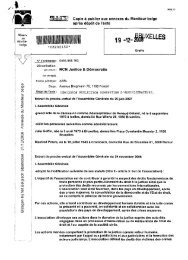Démocratie
Extrait du bulletin n°22 - RCN Justice & Démocratie
Extrait du bulletin n°22 - RCN Justice & Démocratie
- No tags were found...
Create successful ePaper yourself
Turn your PDF publications into a flip-book with our unique Google optimized e-Paper software.
Rwanda<br />
A lot of NGOs are working for victim’s rights, RCN Justice & <strong>Démocratie</strong> currently supports the<br />
itinerant trials of the suspects of genocide crimes, which contributes to an improved proximity<br />
of justice for the victims and the witnesses who become effective actors in the judicial process.<br />
Ibuka is a NGO advocating for the rights of the survivors of genocide.<br />
Victim’s rights in national and international justice<br />
12<br />
The rights of the victims of International crimes<br />
have been progressively integrated in the International<br />
Conventions. Ignored by the Geneva<br />
Convention of 1949, it is notably stipulated in the<br />
International Covenant on Civil and Political rights in<br />
1966 under the principle of the right to file a lawsuit and<br />
the right for the victims to receive indemnities for violation<br />
of their fundamental rights.<br />
Devoted and detailed by the Declaration of basic principles<br />
of justice for victims of crime and abuse of power<br />
adopted in 1985 (1), the rights of the victim cover henceforth<br />
the right to submit a court case, the right to psychological<br />
assistance throughout the trial, the right to<br />
protection of witnesses, the right to reparation of the<br />
damages suffered and refund of the property despoiled.<br />
The right recognised to victims is contained in a report in<br />
1999 of Special Reporter Cherif Bassiouni2 highlighting<br />
the principles of reparation to the victims of international<br />
crimes.<br />
At national level, in Rwanda, the rights of the victims<br />
of genocide are practised both in classical and Gacaca<br />
courts. However, it is important to acknowledge that in<br />
the actual context, such right has encountered difficulties<br />
so as to be fully effective. If they can freely bring a<br />
case to court, the question of security of witnesses, the<br />
delay of the promulgation of the law on reparations, the<br />
trauma healing which needs psychological assistance<br />
remain crucial concern and makes it even deterrent for<br />
the victims to take part in the process of justice.<br />
The rights of the victims are a concern for both the<br />
Government and the civil society organisations. Ibuka,<br />
being an umbrella organisation for the survivors’ organisations<br />
in Rwanda, represents the survivors of genocide<br />
both at national and international levels. It was established<br />
in 1995 and it acquired its legal personality in 2001.<br />
Ibuka’s primary responsibility consists in advocating for<br />
the rights of the survivors of genocide, including issues<br />
of justice, memory, and their social and economic problems.<br />
In the framework of representing the survivors on<br />
diverse levels, Ibuka has branches in various countries<br />
notably: Belgium, Switzerland, France, United Kingdom,<br />
Canada and another branch is underway to be established<br />
in Uganda.<br />
The collaboration between the branches is based on<br />
information sharing mostly on justice issues, notably


